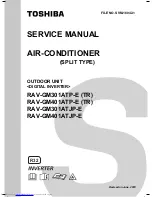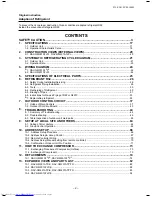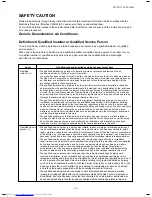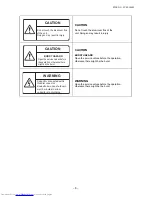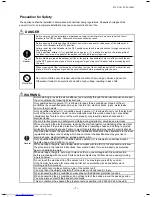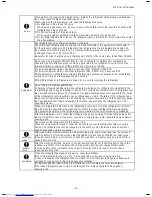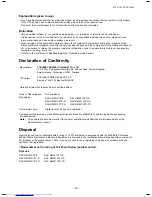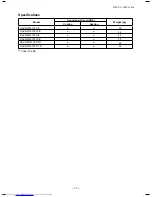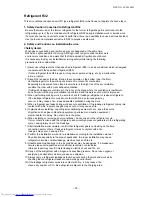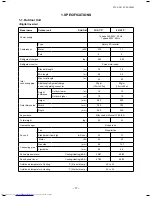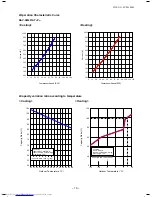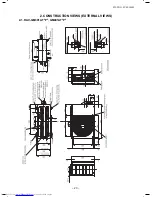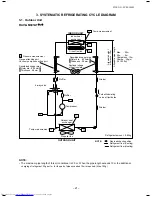
–
7
–
Before carrying out the installation, maintenance, repair or removal work, be sure to set the circuit
breaker to the OFF position. Otherwise, electric shocks may result.
Before opening the intake grille of the indoor unit or service panel or valve cover of the outdoor unit,
set the circuit breaker to the OFF position.
Failure to set the circuit breaker to the OFF position may result in electric shocks through contact with
the interior parts.
Only a qualified installer (
1) or qualified service person (
1) is allowed to remove the intake grille of
the indoor unit or service panel of the outdoor unit and do the work required.
Before starting to repair the outdoor unit fan or fan guard, be absolutely sure to set the circuit breaker
to the OFF position, and place a “Work in progress” sign on the circuit breaker before proceeding with
the work.
When cleaning the filter or other parts of the indoor unit, set the circuit breaker to OFF without fail, and
place a “Work in progress” sign near the circuit breaker before proceeding with the work.
DANGER
Turn off
breaker.
Prohibition
SVM-13072.indb 6
SVM-13072.indb 6
11/01/13 1:53 PM
11/01/13 1:53 PM
WARNING
Before starting to repair the air conditioner, read carefully through the Service Manual, and repair
the air conditioner by following its instructions.
Only qualified service person (
∗
1) is allowed to repair the air conditioner. Repair of the air
conditioner by unqualified person may give rise to a fire, electric shocks, injury, water leaks
and/or other problems.
Only a qualified installer (
∗
1) or qualified service person (
∗
1) is allowed to carry out the electrical
work of the air conditioner. Under no circumstances must this work be done by an unqualified
individual since failure to carry out the work properly may result in electric shocks and/or
electrical leaks.
Wear protective gloves and safety work clothing during installation, servicing and removal.
When connecting the electrical wires, repairing the electrical parts or undertaking other electrical
jobs, wear gloves to provide protection for electricians, insulating shoes and clothing to provide
protection from electric shocks. Failure to wear this protective gear may result in electric shocks.
Use wiring that meets the specifications in the Installation Manual and the stipulations in the local
regulations and laws. Use of wiring which does not meet the specifications may give rise to
electric shocks, electrical leakage, smoking and/or a fire.
Only a qualified installer (
∗
1) or qualified service person (
∗
1) is allowed to undertake work at
heights using a stand of 50 cm or more.
When working at heights, use a ladder which complies with the ISO 14122 standard, and follow
the procedure in the ladder’s instructions. Also wear a helmet for use in industry as protective
gear to undertake the work.
When working at heights, put a sign in place so that no-one will approach the work location,
before proceeding with the work. Parts and other objects may fall from above, possibly injuring
a person below.
Do not touch the aluminum fin of the outdoor unit. You may injure yourself if you do so.
If the fin must be touched for some reason, first put on protective gloves and safety work
clothing, and then proceed.
Do not climb onto or place objects on top of the outdoor unit.
You may fall or the objects may fall off of the outdoor unit and result in injury.
When transporting the air conditioner, wear shoes with additional protective toe caps.
When transporting the air conditioner, do not take hold of the bands around the packing carton.
You may injure yourself if the bands should break.
This air conditioner has passed the pressure test as specified in IEC 60335-2-40 Annex EE.
General
FILE NO. SVM-18042
Precaution for Safety
The appliance shall be installed in accordance with national wiring regulations. Capacity shortages of the
power circuit or an incomplete installation may cause an electric shock or fire.
Do not turn ON the circuit breaker under the condition of removing a cabinet, a panel, etc.
Otherwise, it leads to an electric shock with a high voltage, resulting in loss of life.

